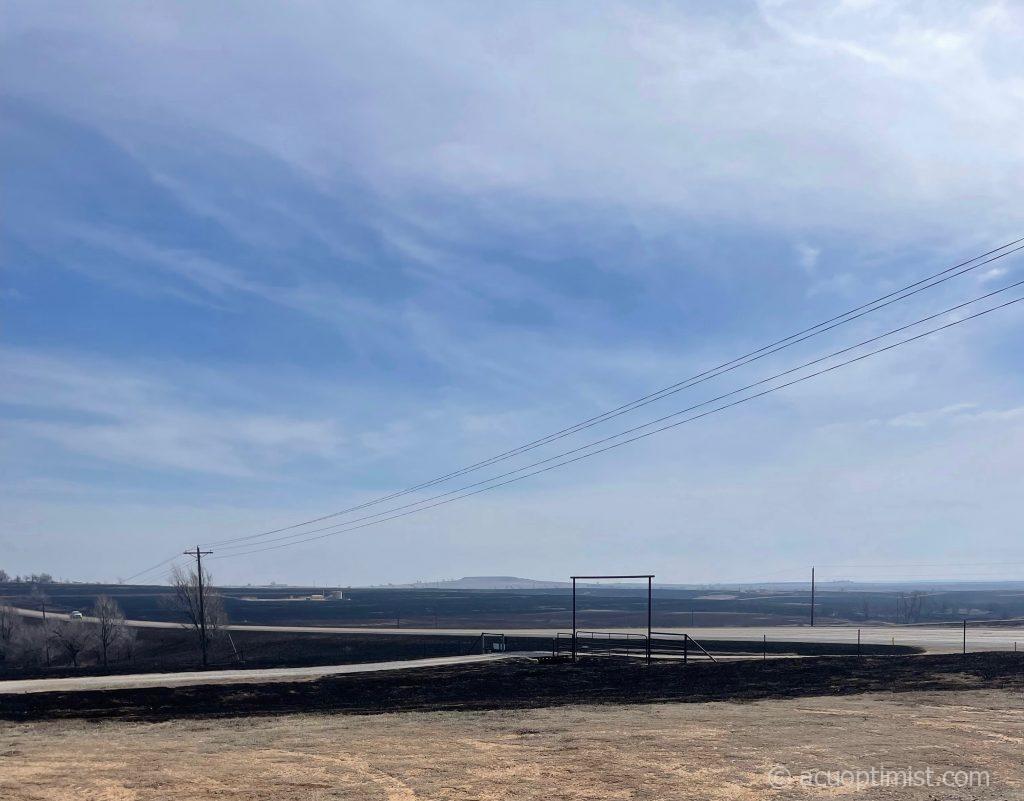For more than a month, Peyton Dockray has been dealing with trauma from nearly 300 miles away.
Dockray is a senior kinesiology major from Canadian, a city that recently burned in a fast-moving grass fire that turned into the second-largest fire in U.S. history. The fire’s destruction extended to almost 1.1 million acres as the flames from the original fire merged into another in the Panhandle.
This fire started on Feb. 26 and was attributed to a fallen utility pole, one owned by Xcel Energy, which is now facing a lawsuit. The utility pole near Stinnett, was knocked over by strong winds, according to the lawsuit.
This broken pole led to multiple acres of farmland torched and destroyed, thousands of cattle and other animals dead and the death of some people as it consumed dozens of homes.
“After going through it myself and my family in 2017, now we know what people are experiencing and what we need to do to help them or try to help them,” said Chaz Rutledge, an assistant chief of the Locust Grove Volunteer Fire Department. “There is a lot of feelings of helplessness. When a fire is moving that fast, even at containment, you cannot chase it, cannot fight it adequately or put enough water out there to stop that fire.”
Wildfires are not new for these communities in the panhandle, but that does not mean the people in these communities are prepared for this type of destruction.
“It was just so chaotic,” said Shannon Cochran, Canadian community member who drove around giving aide during the fire. “I noticed that we were all stretched so thin.”
Fires can become deadly quick, especially in communities that are surrounded by fields. This makes fires hard to contain, causing these large amounts of destruction. Gregg Abbot stated in a New York Times article that early assessments suggested about 400 to 500 structures had been destroyed by this wildfire. Several firefighters and other emergency workers were also injured.
Along with the devastating land that was lost, multiple cattle lost their lives as well. Cattle that did not die initially from the fire but were injured had to be killed. Cattle that survived had to be relocated as they had no food or water to survive.
Fires are not unusual in Texas and can happen in the summer, but the highest risk is in March when temperatures change to a hotter temperature and strong winds happen. This can cause dry grass which can start a flame.
Dockray’s family lives 10 miles outside of city limits to Canadian, but this is still considered part of the town. Some of Dockray’s family members within city limits had to evacuate to her parents’ house, but this did not last long. Her family was evacuated three times before the fire was contained and eventually burned out.
“I felt very worried because I did not know the details about what was going on and was worried about the people that were stuck in Canadian,” Dockray said. “I wanted to help and be with my family, but couldn’t, so I felt stuck and helpless.”
Dockray’s family home survived the fire, but the land did not. Her family lost several acres of land, and some items on the property. The shed that was in the back of the house, once filled with family memories and keepsakes, is now in ashes.
Dockray says she feels fortunate to still have a home to go to, as many do not have this, but is still sad about the memories that were lost.
“It was sad to know that I lost items that once had memories like Christmas items and baby clothes, but it pales in comparison to the loss of others,” Dockray said.
Dockray will graduate in May and will continue her education at ACU in the doctorate program of occupational therapy. She is an honors student involved in multiple organizations on and off campus including Tri Kappa Gamma, Kinesiology Club and a volunteer at Palm House.
“People within organizations that I am involved in and people around ACU reached out to me to check on my family and how I was doing,” Dockray said. “It made me feel how the ACU community has your back and how the presence of God shines through communities in times of tragedy.”
Canadian was helped by many local communities and organizations, which include the Amarillo Area Foundation, the Working Ranch Cowboy Association, the Texas Panhandle 100 Club and the Hemphill County AgriLife Extension Service. The fires ended in early March, but the community still needs help and these organizations have easy websites to donate for the fire relief.

